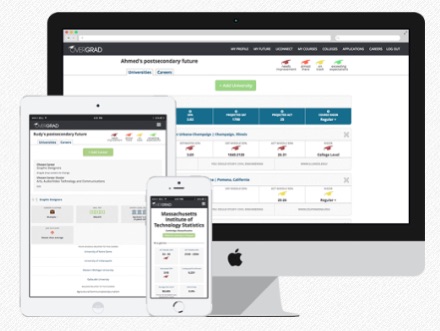Part of my goal here is to help parents find the tools they need to prepare for college. In today’s post, I’m featuring a free site that helps your student choose a career and find the right college fit.

As a parent, you most certainly think about your child’s future. You may see them as an engineer, a teacher, or a doctor. You may picture them at your alma mater, or being the first in your family to attend college. Maybe you just hope they find a passion and pursue it. Whatever you hope, you want what is best for your child and to support them in achieving their goals.
If you read parenting blogs, books, or articles, you know family support impacts a student’s academic success and transition to college, career, etc. You also likely know that the earlier students set goals and start preparing for life after school, their chances of reaching those goals are increased. Preparing for college as a freshman looks different than as a junior, but it is just as important for both students to connect their work today to the outcomes of their future tomorrow.
When students plan for the future early-on, they are more likely to enroll in rigorous courses, sign up for appropriate electives, become involved in extracurriculars, and consider their overall academic performance more seriously. More importantly, they learn the expectations of their goals, such as a necessary GPA, test-scores, course-load, leadership experiences, etc. By understanding these expectations early, students are empowered to take action over many years, rather than finding out it is too late, as a senior applying to schools.
While you may know what your child should do, it is not always clear how to help your child do it. With your best intentions in hand, you may ask ‘Where do I start?’ or ‘What resources are available?’
There are many resources that help with college searches, including the College Board, College Search, College View, and Princeton Review. However, there has never been a resource that combines all of the different aspects of college and career planning into one platform, and certainly not for free. As a result, we are excited to introduce you to Overgrad.
Overgrad is a completely free platform, which helps students and parents plan for life after high school. Students discover different careers and colleges that match their interests and abilities, and then receive personalized feedback, highlighting areas of improvement throughout high school. For example, you may wonder ‘Is my son’s GPA currently on track to gain admission to his ideal college?” or “Is my daughter taking the appropriate classes to be prepared for an engineering program?” Overgrad is a tool that will answer these questions.
Other specific features:
How can Overgrad help you and your student??
- Explore Careers and Colleges
Thinking about the future is often daunting, and when it comes to choosing colleges and careers, students might not be sure where to start.
To help solve this issue, have your student take the Overgrad Career Interest Survey. Overgrad uses this survey to generate a list of possible careers aligned to your student’s indicated interests. Students can retake this survey as many time as they like, as we know interests change. This survey however, is merely a starting point. Students can also search over 1,000 other opportunities on the Overgrad “Careers” tab using filters such as “projected job growth, industry type, salary, etc.”
Students are also matched with colleges in a similar way. Overgrad uses your student’s current academic progress (GPA, test scores, courses) to match them with universities that are currently on their level. Students can use other filters such as type of university, location, graduation rates, etc. to narrow down their college list. We also will allow them to view a unique profile for each college to to learn more before choosing their top schools.
- Choose the right classes
It is important to pay attention to your child’s class schedule to ensure they are meeting their high school’s graduation requirements and the basic admission requirements for colleges. In addition, colleges often take into consideration the rigor/difficulty level (honors, AP, etc.) of students’ schedules. Overgrad helps, by tracking what classes your student is taking and comparing their current courses to the expectations of the colleges on their list. If a college expects a more rigorous course load, you and your child will know.
- Take Action
Once your child has found the best career and college matches, they add these goals to their personal “My Future” page by clicking “follow”. Their My Future page shows all their future college and career goals, as well as helps students track their progress towards meeting them. Additionally, students will see both their strengths and areas they might want to improve to increase their admissions chances for each college on their list. In the example below, Angelica is able to use the colored graduation caps to see how her GPA, test scores, and courses compare to each of her top schools admissions requirements. As students improve overtime, they can actively monitor their progress, and even see a college they are interested in change from a “reach” school to a “match”.
Interested in exploring Overgrad?
Overgrad is accessible on any device—including laptops, phones, tablets, and PC’s and is absolutely free!
To start using our resources simply visit overgrad.com to create an account with your student.
We also offer Overgrad as a free resource to any school so feel free to talk to your school principal and/or guidance counselor if you would like to see Overgrad provided as a resource for all students.
If you have any additional questions along the way, feel free to email erin@overgrad.com.

